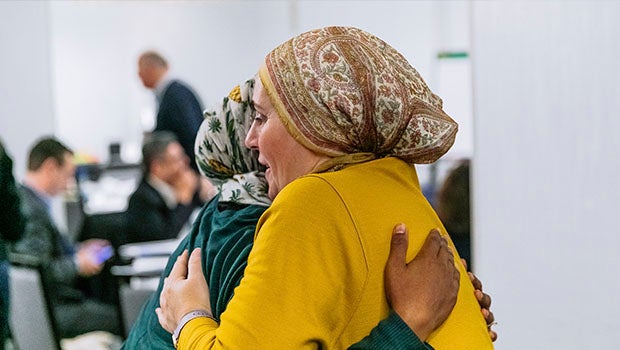
For Jewish, Christian, and Muslim communities, April is important this year. Jews will celebrate Passover, starting on April 8, as “the story from constriction to freedom,” said Rabbi Sara Luria. Christians will celebrate Easter on April 12 as the anniversary of Jesus’s resurrection and as “the holiest moment in the Christian liturgical calendar,” shared Reverend Jennifer Bailey. Less than two weeks later, Muslims will celebrate the start of Ramadan on April 23. For Imam Omar Suleiman, it is a time usually marked with busy mosques and increased giving.
This year, amid the coronavirus pandemic and physical distancing, each holiday will be observed in new ways. The fear and uncertainty accompanying this moment are prompting many to draw on their faith traditions for hope and to make sense of all that is happening.
Imam Omar Suleiman spoke of the promise that blessings can also attend sorrow. “The verse (Qur’an 94:5-6) says, ‘with every hardship comes ease.’ One way to understand that is that as hardship is decreed, the ease has already been decreed with it. There is a certainty that ease will come.”
In speaking on the Book of Lamentations, written after the destruction of the First Temple in Jerusalem, Rabbi Sara Luria reminded us, “Those who canonized the Jewish Bible, they knew that in the future people who were struggling would need the words of the lonely city and the people in it. They would need to know that it is OK to sit in the how, the mourning, and the grieving … to know that your ancestors have done it before you.”
Rev. Jennifer Bailey offered a remembrance that our communities and traditions endure even in times of trouble, saying, “There are some things that are eternal and, there are some things that we can lean on—whether it be our traditions or one another.”
For each faith leader, the inability to be physically present with their communities has led them to get creative in how they spread these messages of hope and perseverance. Video calls, meditation practices, and singing circles are occurring online and extending to communities that may even be larger than those that could be physically present in normal circumstances.
All three faith leaders acknowledged that there might be lessons from this moment we want to carry with us after social distancing is relaxed. Rev. Jennifer Bailey described how her telechurch and telebible study had brought an unexpected gift of accessibility. Imam Omar Suleiman shared that this moment is an opportunity for faith communities to teach America the power of showing up for one another. Rabbi Sara Luria emphasized that this moment of shared grieving, fear, and loneliness reminds us how connected we all are.
Another “great gift of faith communities,” Rev. Jennifer Bailey said, “is that we have always attempted to give words to the unimaginable and indescribable. We can’t forget that in this moment, and we can’t forget to continue dreaming and imagining.”
While there is no denying that Passover, Easter, and Ramadan will look different this year, the power of dreaming and imagining offers hope for individuals and communities that we may meet again with renewed faith and reimagined rituals for a brighter future.
Watch a recording of the full panel here.


